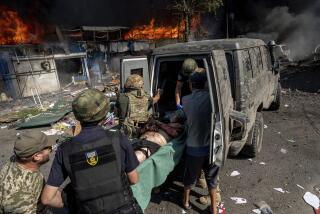World Cannot Ignore the Unfolding Horror : International aid needed for suffering Kurds
- Share via
Consciences haunted by historical memories of some of this century’s most terrible genocides--of Armenians, of Europe’s Jews, of Cambodians--must be deeply moved by tales emerging from Iraq about what that country’s desperate Kurdish minority faces.
The northern Kurds, like Shiites in southern Iraq, rose in revolt against Saddam Hussein’s brutal rule after Iraq was defeated by U.S.-led coalition forces. It was a brave effort but, as so often before in the Kurds’ bitter history, a doomed one. First Iraq’s armed forces, still possessed of thousands of tanks and artillery pieces, crushed the Shiite uprising. Then they moved against the Kurds. The outcome was all but preordained.
Tens of thousands of Kurds--some reports say hundreds of thousands--have fled their villages and cities. Many seek refuge in Turkey and Iran, both of which have their own substantial Kurdish minorities. Iran says it will provide asylum, and asks for international aid. Turkey says it won’t open its borders to a mass influx. The fate of a large community may now hang in the balance. Few expect that an Iraqi regime infamous for its cruelty will not seek harsh revenge against those who dared to challenge its rule.
Does the outside world--most of all meaning the United States, which retains powerful forces in the area--have any obligation to try to halt what many fear could become a great slaughter?
International law dictates that what happens within Iraq’s borders--or the borders of any other sovereign nation--must be recognized as an internal affair, beyond the reach of foreign intervention. There are sound reasons and a lot of experience sanctifying that doctrine. Without it, national boundaries would become essentially meaningless, foreign predators could move into other countries at will under pretext of protecting life or restoring order, and international anarchy would prevail.
That is the legal argument for nonintervention. But when children and the elderly are gunned down in the streets by their own government or driven into the mountains to die of exposure, the law’s cold logic seems less compelling. Then humanitarian and moral considerations assume paramount importance.
No member of the anti-Iraq coalition is eager, let alone prepared, to intervene militarily to try to halt Saddam Hussein’s attack on the Kurds, though some have called on the United States to take action. President Bush has rejected that advice, as he should; for this country to plunge into the swamp of Iraqi politics would be unmitigated folly, however selfless the reason.
This doesn’t mean that civilized nations must do nothing while thousands of Kurds face destruction. The U.N. Security Council has just confronted Iraq with severe but necessary restrictions on its sovereignty as a condition to enacting a permanent armistice. The council can, if it chooses, similarly insist that the Iraqi regime must treat the Kurds with decency or, at a minimum, face prolonged sanctions.
Meanwhile, there is an urgent need to mount a significant international effort to assure humanitarian help to those Kurds who are able to flee Iraq. British Prime Minister John Major has taken the lead, appealing to President Bush and the 12-nation European Community to move decisively. The response deserves to be quick and generous.
Iran, which has already taken in tens of thousands of Iraqi Shiites, can’t be expected to carry the burden of Kurdish relief alone. Does the United States have a special obligation in this matter, given its President’s repeated call on Iraqis to rise up against Saddam Hussein? That point seems sure to be debated for some time to come. For now, though, the important thing is that Washington move rapidly to do its part to aid the suffering Kurds.
More to Read
Sign up for Essential California
The most important California stories and recommendations in your inbox every morning.
You may occasionally receive promotional content from the Los Angeles Times.













